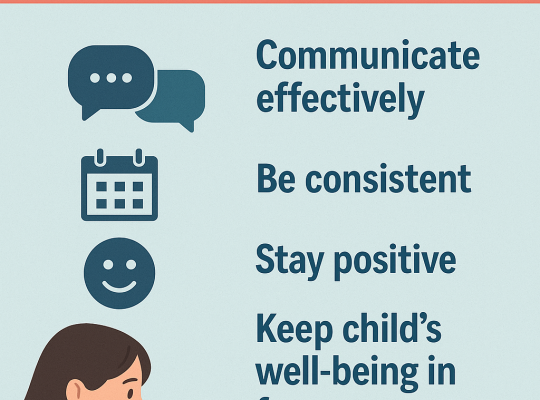In today’s rapidly evolving digital age, parenting has taken on a new level of complexity. The internet and technology are an integral part of our children’s lives, shaping their social interactions, learning habits, and self-esteem. As much as technology offers incredible opportunities, it also brings a host of challenges. With social media, constant connectivity, and a digital world that often fosters comparisons, it’s more important than ever to raise children who are both confident and resilient.
But how do you help your child navigate this digital world with confidence and resilience? This article will provide you with practical strategies to foster mental strength, self-worth, and the ability to adapt in the face of adversity, while helping them thrive in the digital age.
The Impact of the Digital World on Kids and Teens
Before diving into practical strategies, let’s take a look at how the digital world is shaping today’s youth:
-
Social Media Pressure: Platforms like Instagram, TikTok, and Facebook can influence how kids perceive themselves and others. The constant exposure to “perfect” images, lifestyles, and achievements can foster low self-esteem and unrealistic expectations.
-
Cyberbullying: The anonymity of the internet makes it easier for children and teens to experience bullying, often in more harmful ways than traditional face-to-face interactions.
-
Overexposure to Technology: Excessive screen time can lead to issues such as poor sleep, lack of physical activity, and difficulty in forming face-to-face relationships.
-
Constant Comparison: With the constant flow of curated content, kids can start measuring their worth by likes, followers, and external validation, instead of internal confidence.
Raising Confident and Resilient Kids in a Digital World
Now that we understand the challenges, let’s explore the essential ways to help kids grow into confident, resilient individuals despite the digital pressures they face.
1. Encourage Healthy Digital Habits
The Challenge:
Unregulated screen time can lead to a multitude of issues: addiction, poor sleep patterns, and difficulty with self-regulation.
Solution:
-
Set Boundaries for Screen Time: Implement limits on daily screen time to ensure that kids have time for other activities like outdoor play, reading, or spending quality time with family.
-
Tech-Free Zones: Designate certain areas of the home (such as the dinner table and bedrooms) as tech-free zones to encourage face-to-face communication.
-
Monitor Online Activities: Keep track of the websites and apps your children are using. Use parental control software to ensure age-appropriate content is being consumed.
Tip: Encourage kids to use technology for learning and creativity, such as coding games, educational videos, or drawing apps, instead of mindlessly scrolling through social media.
2. Promote Positive Online Engagement
The Challenge:
The digital space can foster negative behaviors such as cyberbullying or the pressure to conform to online trends.
Solution:
-
Teach Empathy: Have conversations about online behavior and the importance of empathy when communicating online. Make it clear that what they say or post can hurt others.
-
Focus on Positivity: Encourage kids to follow accounts that promote positivity, self-love, and healthy habits. Help them identify influencers who contribute to meaningful discussions and self-improvement.
-
Report and Block: Teach them how to report cyberbullying and block accounts that make them uncomfortable.
Tip: Help your child recognize that their self-worth should not be tied to likes or comments on social media. Real-world values should always take precedence.
3. Build Strong Communication Skills
The Challenge:
Children who are used to communicating through screens may struggle with face-to-face interactions, making it difficult to express emotions, opinions, or needs confidently.
Solution:
-
Practice Conversation: Regularly engage in one-on-one conversations with your children. Ask open-ended questions about their day, their thoughts, or their feelings. This encourages emotional literacy and allows them to practice expressing themselves.
-
Role-Playing: Use role-playing scenarios to help them practice responding to difficult situations, like conflict resolution or how to ask for help.
-
Model Healthy Communication: Children learn by example. Be mindful of how you communicate, especially in tough situations. Showing respect, patience, and openness will encourage them to do the same.
Tip: Encourage kids to use their voice—whether it’s speaking up for themselves, setting boundaries with friends, or advocating for what they need online.
4. Encourage Real-World Experiences
The Challenge:
Too much time spent in front of a screen can diminish real-world experiences, such as outdoor activities or social interactions with peers.
Solution:
-
Balance Screen Time with Physical Activity: Encourage kids to engage in outdoor activities like sports, hiking, or even simple walks around the neighborhood. These activities help improve physical health, reduce stress, and provide opportunities for socializing in real life.
-
Create Family Time: Set aside time for family activities that don’t involve screens—game nights, cooking together, or outdoor outings are great ways to bond and promote resilience through shared experiences.
-
Encourage Hobbies and Interests: Help your child discover hobbies they’re passionate about, whether it’s art, music, or sports. Encouraging them to explore new interests builds their self-confidence and resilience.
Tip: Real-world experiences help kids develop a sense of accomplishment and self-worth that can’t be found online.
5. Foster a Growth Mindset
The Challenge:
The digital age has made success seem like an overnight achievement, especially when kids compare themselves to “influencers” or online personalities who appear to have it all.
Solution:
-
Teach the Power of Yet: Help kids understand that skills and success come with time and effort. Instead of saying, “I can’t do this,” teach them to say, “I can’t do this yet.” This shift in thinking encourages resilience and perseverance.
-
Celebrate Effort, Not Just Results: Praise your child for the effort they put into something rather than just the outcome. This teaches them that perseverance is valuable, even if the result isn’t perfect.
-
Normalize Failure: Share your own experiences of failure and how you overcame challenges. Teach them that failure is a part of the learning process.
Tip: Resilient kids learn to view challenges as opportunities to grow, rather than obstacles to their happiness.
6. Teach Digital Citizenship
The Challenge:
Kids are often unaware of the importance of digital responsibility, both in terms of how they present themselves online and how they interact with others.
Solution:
-
Discuss the Importance of Privacy: Teach your child the importance of keeping personal information safe, including phone numbers, addresses, and passwords. Encourage them to think critically before sharing details online.
-
Encourage Respectful Online Behavior: Discuss appropriate online etiquette—be respectful, kind, and mindful of others’ opinions.
-
Teach the Power of Digital Footprints: Explain how everything posted online leaves a permanent record. Encourage your child to think twice before posting anything they wouldn’t want to be associated with in the future.
Tip: Help your child see that they control their narrative online and that their behavior matters—both offline and online.
7. Support Emotional Intelligence (EQ)
The Challenge:
The digital world can sometimes stunt emotional growth, as children may find it easier to retreat behind a screen than confront their feelings.
Solution:
-
Teach Self-Awareness: Encourage your child to reflect on their feelings and identify what causes them to feel certain emotions. This can be done through journaling, talking, or simply taking a moment to check in with themselves.
-
Teach Self-Regulation: Help your child develop healthy coping mechanisms when they’re stressed, anxious, or upset. This could be deep breathing exercises, mindfulness, or even simply walking away from a frustrating situation.
-
Provide Support During Emotional Challenges: Be open to listening when your child feels down or stressed. Help them process their emotions without judgment or rushing to fix the problem.
Tip: Kids with high emotional intelligence are better equipped to handle challenges, build relationships, and manage stress.
Final Thoughts: Raising Resilient Kids in a Digital World
Raising confident, resilient children in a digital world requires a thoughtful balance of guidance, empowerment, and responsibility. By promoting healthy habits, encouraging face-to-face interactions, fostering emotional intelligence, and teaching kids to navigate the digital landscape mindfully, you can help them develop the skills they need to thrive both online and offline.
As parents, caregivers, or mentors, we have the privilege—and responsibility—to be the guiding force that helps children develop into capable, confident individuals who can embrace the challenges of a digital age while remaining grounded in the real world.


